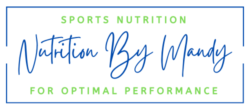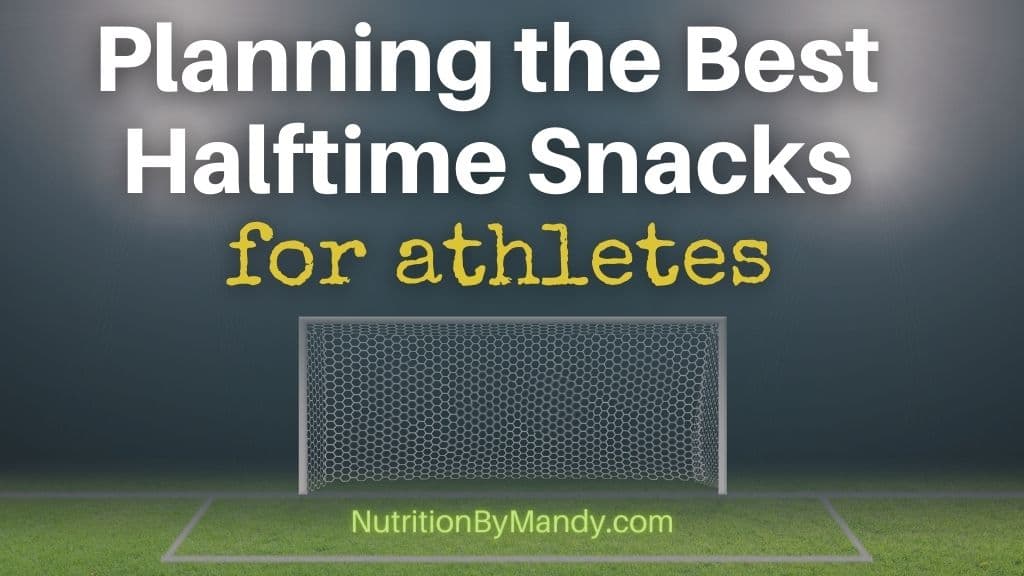Planning the Best Halftime Snacks for Athletes
If you compete in a sport that has a halftime, make sure to take advantage of the break to rehydrate and refuel.
Often games are won or lost in the last minutes. Having a well-planned halftime snack can give you the energy you need to perform at your best until the final buzzer.
Let’s take a look at nutrients needed during competition. Then we will explore halftime snack ideas for athletes.
Planning Halftime Snacks
When planning your halftime snacks, the goal is to choose snacks that will help you replace carbohydrates used for energy during the first half.
You also want to replace the fluid and electrolytes lost in sweat.

Refuel at Halftime with Carbohydrates
Carbohydrates provide the energy athletes need to perform at their best.
In the body, carbohydrates are stored in the liver, muscles, and blood stream. As you exercise, you use up your carbohydrate stores.
During halftime consuming carbohydrates, either from a sports drink or a snack, can help supplement your body’s carbohydrate stores (1). Even if you only consume a small amount, the carbohydrates can provide quick energy for the start of the second half.
Consider experimenting with different types of carbohydrates to find what form works best for you.
For example, do you prefer eating solid food or consuming a sports drink? Are there any carbohydrate-based foods that bother your stomach during activity, such as fruit, gels, or bars?
Each athlete is unique, thus taking time to figure out what type of carbohydrate helps you perform at your best is key.
Rehydrate at Halftime
It is also important to rehydrate during the halftime break. Dehydration can negatively impact performance and increase the risk of heat illness (2).
When you sweat you lose both fluid and electrolytes, thus make sure to consider both in your halftime hydration plan.

Sports Drink vs. Water at Halftime
You can choose to replace fluids with either a sports drink or water at halftime.
A sports drink is formulated to contain carbohydrates, sodium, and a small amount of potassium (2).
When consumed during activity, the carbohydrates in the sports drink provide energy for the working muscles. The sodium and potassium in the sports drink help replace electrolytes lost in sweat.
If you choose to hydrate with water, make sure to consider another option for replacing carbohydrates and electrolytes.
Halftime Snack Ideas to Rehydrate and Refuel
Here are halftime snack ideas to help you meet your hydration and carbohydrate needs.
- Hydrate: Water, sports drinks
- Sport gels or chews
- Orange slices, banana, grapes
- Dried fruit, fruit chews, fruit bars
- Applesauce squeeze pouch
- Carbohydrate-based sports bar, fig bar, granola bar
- Pretzels, animal crackers, graham crackers, snacks crackers
Eating salty, carbohydrate-based snacks (such as pretzels) at halftime can also be a good choice.
The carbohydrates in the pretzels provide energy and the salt helps replace the sodium lost in sweat. Salt also helps stimulate thirst, thus encouraging you to drink more during the break.
Also note, that athletes do not have to eat the full sports bar or piece of fruit during halftime. Even in a few bites of a bar or of a banana can provide the athletes with additional energy as they head into the second half.

Success with Applesauce as a Halftime Snack
A soccer team that I worked with had success with adding applesauce squeeze pouches into their halftime routine.
The team found that the applesauce pouches were a high-carb snack that the players could consume quickly during the break.
Since applesauce is easy to digest, it provided the players with an added source of energy as they headed back out onto the field. In addition, the applesauce pouches were an inexpensive option that easily fit into the team’s budget.
Thus, the applesauce pouches proved to be a winning solution for the team!
Snacks to Avoid at Halftime
There are some snack choices that are not ideal at halftime, let’s take a look at a few.
High-Fat Snacks
Snacks high in fat may cause GI distress during activity, as they are digested slowly in the body.
For this reason, at halftime avoid high-fat snacks, such as fried foods, greasy foods, and dessert-type items.
High-Fiber Snacks
During competition we want to provide the body with quick energy that can be immediately used for activity. Fiber slows down digestion, thus high-fiber foods are not an ideal halftime snack.
Fiber is important in an athlete’s diet, but high-fiber foods are best consumed outside of competition.
Carbonated Beverages
Drinks with carbonation may make you feel bloated or bother your stomach during activity.
Choose plain water or a sports drink over a beverage with added fizz.
Don’t Overdo the Halftime Snacks
When it comes to sports nutrition, it is easy to think that if some is good, more must be better.
However, consuming too much of some nutrients may lead to GI distress or cause you to feel bad during the second half.
Too Much Carbohydrates with Your Halftime Snacks
Consuming too much carbohydrate during the halftime break may result in an upset stomach or other GI concerns.
I have seen this occur when athletes consume multiple carbohydrate-based sport foods at once. For example, consuming gels, chews, and a sports drink all together during halftime.
Consuming 30-60 grams of carbohydrates per hour is recommended for endurance exercise lasting over an hour. This recommendation applies to athletes participating in team sports that involve frequent starting/stopping (1).
This amount is recommended based upon the body’s ability to absorb carbohydrates during activity. When athletes consume way over this amount, particularly from a single type of carbohydrate (glucose, fructose), GI distress may occur.
Consuming concentrated forms of carbohydrates, such as sugary drinks (soda) or fruit juice during the halftime break may similarly lead to GI discomfort in the second half (3).
Too Much Caffeine During Competition
Athletes may desire to use caffeine during activity in an effort to increase alertness, improve cognitive function, and compete at a higher intensity (4).
In the hour before exercise, typical caffeine recommendations are to consume 3-6 mg of caffeine per kg of body weight. When caffeine is consumed during exercise it should be at a lower dose (< 3mg/kg body weight or ~200 mg) and taken with a carbohydrate source (4).
When it comes to caffeine, consuming too much before and during activity can definitely be problematic.
Higher doses of caffeine (≥9 mg/kg body weight) increases the risk of side effects, such as jitters, anxiety, and nausea, and does not provide an increased performance benefit (4).
While these are general guidelines, be mindful that there are individual variations in how athletes metabolize and respond to caffeine intake (5).
Some athletes may find a benefit from a lower dose of caffeine or have undesired side effects from smaller amounts.

Practice Your Halftime Snacks
Just as you practice your plays for the game, it is important to practice what snacks you will use during competition. Do not try new halftime snacks for the first time on game day.
Individuals vary in what foods they tolerate and feel best performing on. You want to go into competition confident in your sports nutrition fueling plan.
For additional sports nutrition strategies for competition, check out my blog on recovery nutrition strategies for athletes.
In addition, consider meeting with a sports dietitian nutritionist for an individualized sports nutrition meal plan customized for your unique performance goals.
Join the Nutrition By Mandy Email List & Get a Free Athlete’s Grocery List
Click HERE to join the Nutrition By Mandy e-mail list. When you join you will receive a free athlete’s grocery list to print and take with you to the store.
About the Author
Mandy Tyler is a Sports Dietitian Nutritionist in the San Antonio, TX area. She is a Registered and Licensed Dietitian, a Board-Certified Specialist in Sports Dietetics, a Licensed Athletic Trainer, and is a Certified Exercise Physiologist through the American College of Sports Medicine. Mandy has experience working with athletes at the high school, collegiate, and professional levels. She believes the key to reaching one’s full potential, both in everyday life and in sports performance, relies on a healthy nutritional foundation.

If you are looking to take your performance to the next level, make sure to check out my new Sports Nutrition Game Day Guide. This downloadable guide is written to help athletes develop an individualized plan to achieve peak performance on game day.

